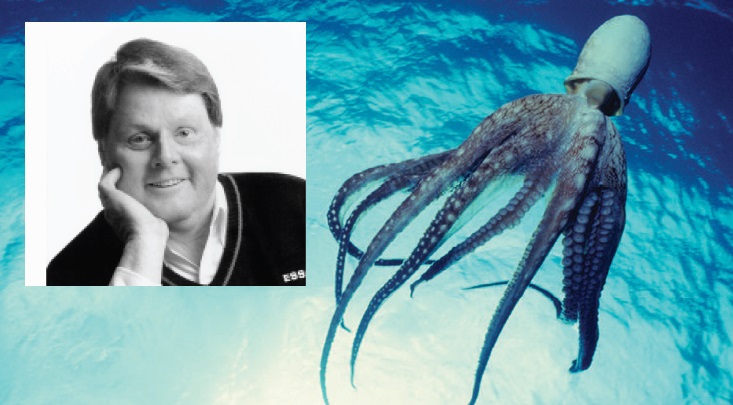Remembering Don’s octopi
Evan Zabawski | TLT From the Editor August 2010
Paying tribute to a mainstay of the Canadian lubrication world.

Don’s convincing case for 0W-30 multigrade oil: ‘Picture an octopus swimming in the ocean…’
When I first met Don Riddell at a seminar in 1998, his presentation on viscosity grades converted me to 0W-30, an oil he promised would run better year-round and give better fuel economy—it does. Don had well over 10,000 other students, or converts, through the latter part of his 41-year career with Imperial Oil, a Canadian petroleum company largely owned by ExxonMobil. Though he passed away on June 19, he left an indelible mark on all members of his audience whether at one of his seminars or at a local STLE meeting, where it was practically an annual tradition to have him present a topic.
As soon as Don would begin speaking in his energetic, anecdotal style, you had two guarantees: (1.) You were going to learn something new, and (2.) You were about to be entertained. Most of our local members who are in a position to give presentations will borrow an anecdote or two of Don’s, and I would like to share the (publishable) one that is my favorite.
Whether explaining the merits of 0W-30 or simply discussing multigrade oils, Don would be compelled to talk about the viscosity improver additive. Rather than wax technical about polymethacrylates, he would just tell you to picture an octopus swimming in the ocean.
“When that octopus is swimming in cold water, he would be like this,” Don would say as he would enthusiastically pull his arms around his body and mimic shivering. “But,” he would continue, “he would go like this when he swims into a nice, hot current,” and then he would comically flop out his arms, cock his head and loll out his tongue as though he was suffering from the heat.
Paying little attention to the weird stares from the audience members who were wondering where he was going with this, Don would just smile and carry on with a look that told you to trust him. “Now, imagine there are millions of tiny octopuses…octopi…whatever, floating around in the oil. The oil wants to thin as it is heated, but if all these octopuses/octopi are flinging their arms, er, tentacles out, then the oil isn’t going to thin out as much because they are taking up more space and banging into each other.”
At this point, a first-time viewer would have little idea that they were witnessing a carefully crafted analogy that Don had been using for many, many years, because his energy level fooled you into thinking he was genuinely excited about this apparently new topic, and his delivery always contained quasi-errors.
“Now if we take a 0-weight oil and cram it full of octopi—see, I got it right this time,” giving a twinkling wink as he talked, “we can make that oil behave less like a 0-weight at the higher temperature and more like a 30-weight.” Sometimes he would then interrupt himself and say, “Did you know that the ‘W’ stands for winter, not weight? Crazy, huh?” with an incredulous tone as if he himself just learned this. Concluding with, “That’s how we make multigrade oils. We stuff them full of long-chain polymers that act just like octopi.”
“But what happens to the tentacles if we shove the octopi through tight clearances?” Don would ask as he paced around with his arms sticking out. (If you were lucky enough to be sitting at the right angle, his demonstration would play out like a magic trick.) Making a chopping motion with one hand, against the opposite shoulder, he would fish for somebody to say they would be cut. As soon as he got his required response, he would whip his one arm behind him, making it disappear. “What’s another word for cut?” he would ask and, seldom waiting for a reply, answer his own question with “Shear.”
And in that instant you realize that you’re now learning about the difference between temporary and permanent shear and why multigrade oils are the most prone to this damage—they are full of Don’s octopi.
We miss Don, and his memory will be kept alive in the form of sharing his anecdotes, even if we can’t do an octopus impression half as well as he did.
 Evan Zabawski, CLS, is manager of training and education services for The Fluid Life Corp. in Edmonton, Alberta, Canada. You can reach him at evan@fluidlife.com
Evan Zabawski, CLS, is manager of training and education services for The Fluid Life Corp. in Edmonton, Alberta, Canada. You can reach him at evan@fluidlife.com.